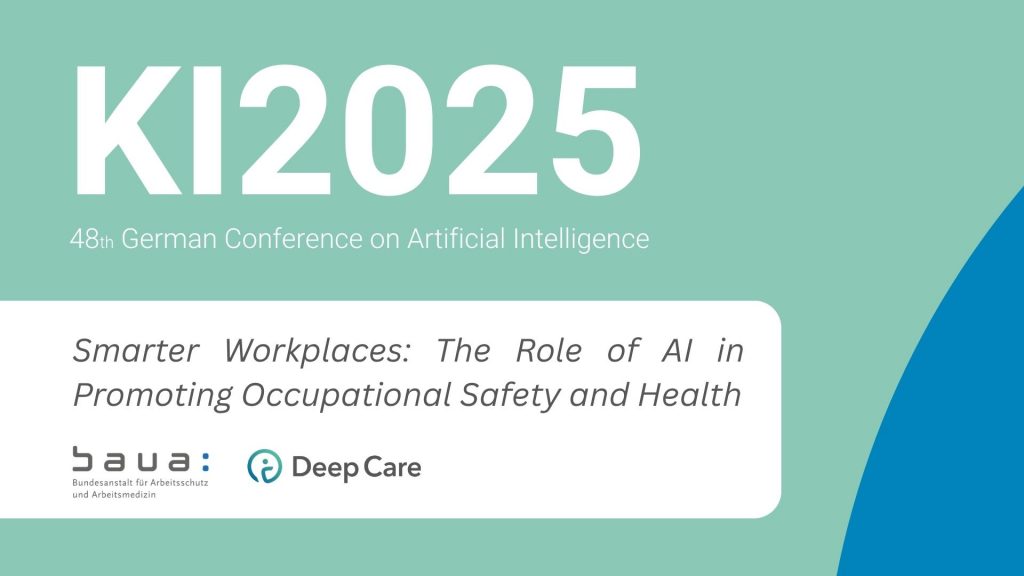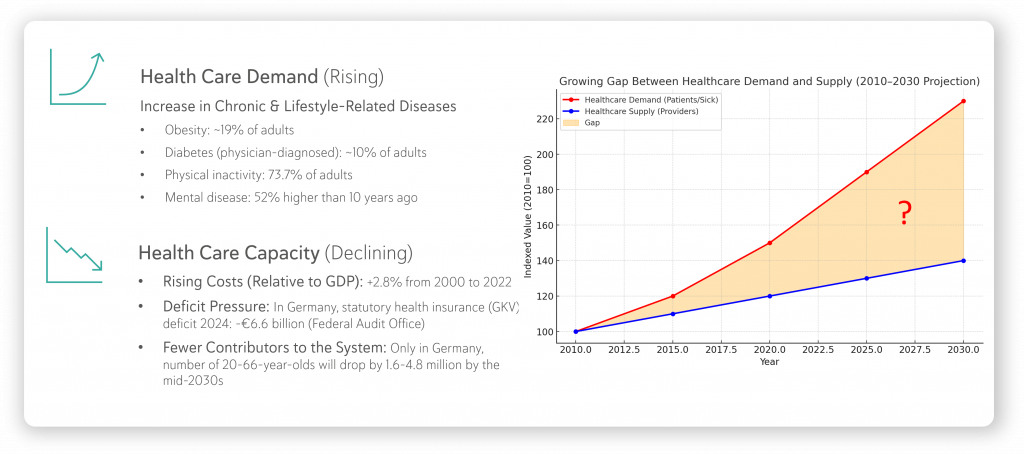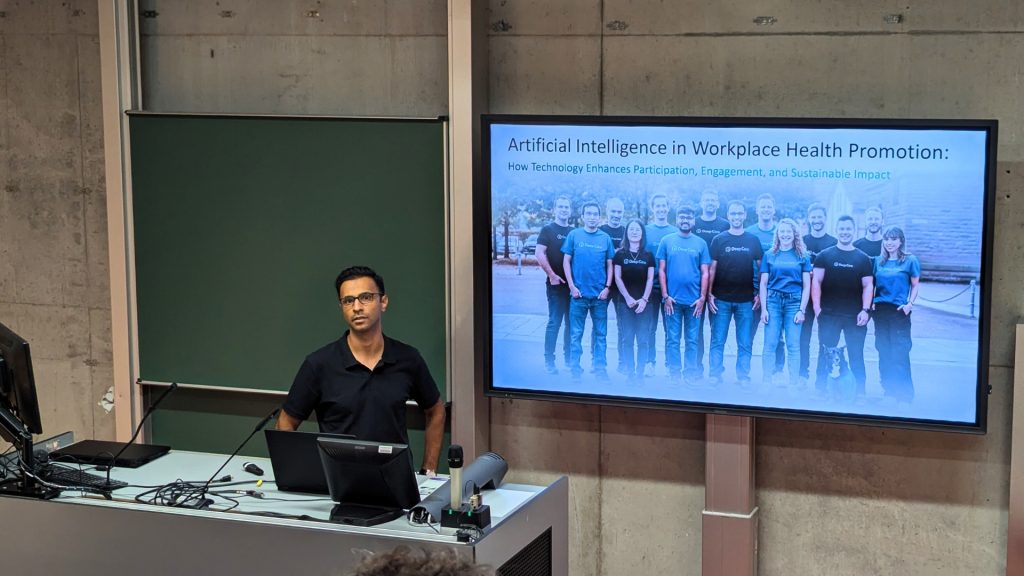
When the doors of the University of Potsdam opened from 16 - 19 September for the 48th German AI Congress it quickly became clear that this was not just about algorithms and data. In the session organised by the Federal Institute for Occupational Safety and Health (BAuA) "Smarter Workplaces: The Role of AI in Promoting Occupational Safety and Health" discussed how artificial intelligence can make workplaces safer, healthier and more humane.
The atmosphere was charged: Researchers, occupational health and safety managers and other company representatives from all over Germany came together to discuss how AI will change the world of work. The focus was not on science fiction scenarios, but on very specific questions: How can AI help to recognise hazards at an early stage? How can digital systems reduce mental stress instead of increasing it? And how can we ensure that AI does not become an instrument of surveillance, but instead supports employees?
From risk assessment to mental health
The contributions to the session showed how broad the spectrum of possible applications for AI has become. Researchers from the IU International University reported on interviews with employees from the insurance industry: on the one hand, AI can relieve stress because it takes over routine tasks - on the other hand, many employees feel pressurised by automated decisions. Their recommendation: companies need to develop targeted measures to recognise and reduce new digital stress factors.
Another inspiring contribution came from Arn Dietz and his team at the BAuA. They are developing sensor networks that continuously monitor working environments - such as light, noise or air quality - and use AI to visualise potential hazards before they cause problems. This was particularly exciting for us, because with Isa pursue an approach that transfers the same idea directly to the office workplace in a personal AI assistant.
The topic of algorithmic management was also discussed intensively. This refers to systems that use AI to distribute tasks, control work processes and evaluate employee performance - for example in logistics or customer service. The discussion made it clear that transparency is crucial here: employees must be able to understand how decisions are made and have the opportunity to have their say.
Against this backdrop, Deep Care presented an approach that particularly interested many of the participants: How can we not only avoid risks, but also actively promote healthy behaviour?
In the article "Artificial Intelligence in Workplace Health Promotion: How Technology Enhances Participation, Engagement, and Sustainable Impact" (Smarter Workplaces, pp. 9 - 13) Milad Geravand and Frederik Blohm showed the research and development results behind workplace assistance Isa. The two explained why traditional OHM programmes often do not have the desired effect: Health days, apps or courses generate attention, but after a few weeks the motivation in everyday life is gone again.
The key finding: for people to really adapt their habits, they need more than good intentions - they need the opportunity to try out the new behaviour, experience small successes and consolidate routines.
This is precisely where Deep Care comes in. The approach combines the latest findings in behavioural psychology with modern AI technology. It is based on models that explain how new routines are created - such as the interplay between motivation, opportunity and ability. This results in micro-impulses that support employees in their everyday lives without overburdening them. The aim is to make health as natural as brushing your teeth every day.
However, in Potsdam, Deep Care not only presented a picture of the current solution, but also a vision for the future: How can AI help to close the growing care gap in the healthcare sector?

The challenges are immense: the need for medical care is increasing while capacities are decreasing. Chronic and lifestyle-related diseases such as obesity, diabetes and stress-related illnesses are on the rise. At the same time, the population is ageing, the number of people in work is falling and statutory health insurance funds are running deficits running into billions.
A significant proportion of these diseases are preventable. Studies show that up to 50 % of chronic diseases - and even 80 % of heart attacks and strokes - could be prevented by a healthier lifestyle.
This is precisely where the leverage lies: Prevention must play a much more important role in the healthcare system in the future. AI can become a key technology here - not as a control instrument, but as an assistant that enables people to live a little healthier every day.

Deep Care's path to this goal is clear: Isa began as a coaching tool for healthy behavioural routines at the desk and is developing step by step - from promoting healthy habits such as exercise, ergonomics and hydration to designing healthy working environments and soon also supporting mental health through stress and focus coaching. In the long term, Deep Care is thinking beyond the office workplace: to other professional groups and into all areas of life - including sport and leisure.
The vision remains unchanged: AI assistance that does not monitor, but accompanies, motivates and empowers - with maximum data protection and the aim of making prevention a natural part of life.
For companies, this approach means that health promotion no longer depends on individual actions, but can become part of the corporate culture. This reduces absenteeism, increases productivity and helps to ensure that employees remain healthy and productive in the long term.
Milad Geravand got to the heart of the matter in Potsdam: "AI must not be seen as an instrument of control. It has the potential to empower people. With Isa, we want to make health so simple that it becomes a matter of course."
The session in Potsdam impressively demonstrated that the design of AI in the workplace is no longer a dream of the future - it is happening now. Companies that start using these technologies responsibly at an early stage not only create competitive advantages, but also a working environment that protects and empowers employees.
Deep Care will continue along this path. Isa is an example of how AI not only makes work more efficient, but also healthier. And perhaps that was the most important realisation of the day: when technology and people work well together, everyone benefits in the end - employees, companies and society.
You are currently viewing a placeholder content from HubSpot. To access the actual content, click the button below. Please note that doing so will share data with third-party providers.
More InformationYou are currently viewing a placeholder content from HubSpot. To access the actual content, click the button below. Please note that doing so will share data with third-party providers.
More InformationYou are currently viewing a placeholder content from HubSpot. To access the actual content, click the button below. Please note that doing so will share data with third-party providers.
More InformationYou are currently viewing a placeholder content from HubSpot. To access the actual content, click the button below. Please note that doing so will share data with third-party providers.
More InformationYou are currently viewing a placeholder content from HubSpot. To access the actual content, click the button below. Please note that doing so will share data with third-party providers.
More InformationYou are currently viewing a placeholder content from Facebook. To access the actual content, click the button below. Please note that doing so will share data with third-party providers.
More Information